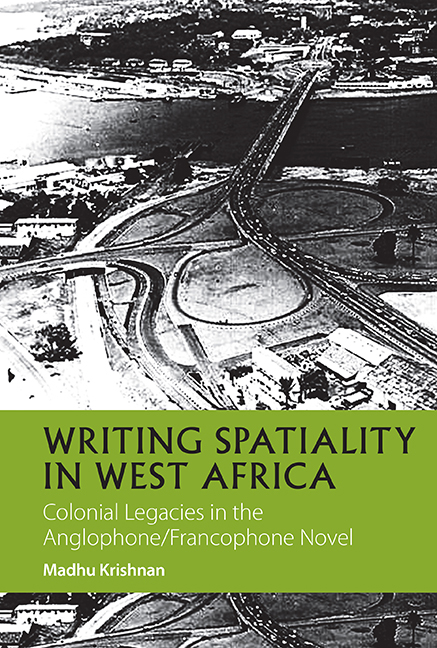Book contents
- Frontmatter
- Contents
- Acknowledgements
- Abbreviations
- Introduction
- 1 Spatiality from Empire to Independence
- 2 Post-independence Disillusionment and Spatial Closures
- 3 Social Space Beyond the Public Sphere: Women's Writing and Contested Hegemonies
- 4 Cosmopolitanism, Migration and Neoliberalism in the Wake of Structural Adjustment
- Conclusion
- Bibliography
- Index
4 - Cosmopolitanism, Migration and Neoliberalism in the Wake of Structural Adjustment
Published online by Cambridge University Press: 15 October 2019
- Frontmatter
- Contents
- Acknowledgements
- Abbreviations
- Introduction
- 1 Spatiality from Empire to Independence
- 2 Post-independence Disillusionment and Spatial Closures
- 3 Social Space Beyond the Public Sphere: Women's Writing and Contested Hegemonies
- 4 Cosmopolitanism, Migration and Neoliberalism in the Wake of Structural Adjustment
- Conclusion
- Bibliography
- Index
Summary
Midway through Teju Cole's 2011 novel, Open City, the narrator, a thirty-something, half-Nigerian, half-German psychiatric resident at New York City's Columbia Presbyterian Hospital, travels to Brussels. During this trip, a journey taken under the auspices of a quest to find the grandmother who he has not seen since the age of eleven, the narrator defines the titular open city for the first and only time in the narrative:
Those were the theaters, so conveniently set at the intersection of Holland, Germany, England, and France, in which Europe's fatal tussles had played out. But there had been no firebombing of Bruges, or Ghent, or Brussels. Surrender, of course, played a role in this form of survival, as did negotiation with invading powers. Had Brussels's rulers not opted to declare it an open city and thereby exempt it from bombardment during the Second World War, it might have been reduced to rubble. It might have been another Dresden.
A military term, the open city refers to a condition where
a belligerent nation, facing possible attack, may declare the target an ‘open city.’ That means that the city will be unarmed and will not be defended. Theoretically, that designation should mean that the city will not be attacked, thus safe from assault.
For Brussels, the city's designation as open would serve ‘to prevent bombing and destruction and to avoid excessive civilian casualties’, allowing it ‘[to remain] a vision of the medieval and baroque periods, a vista interrupted only by the architectural monstrosities erected all over town by Leopold II in the late nineteenth century’ (97). ‘Open’ to surrender rather than liberation, Brussels would be spared the humiliation of defeat in exchange for the stain of capitulation, the expansive field of freedom transformed into its abnegation. Where, in its contemporary significance, the titular open city suggests an alternative reading, hearkening to the mobility of the cosmopolitan subject in the flux of the global or the city open as a space of refuge, this historical interlude reveals the title as a catachresis that exposes its obfuscating limitations as the narrative unfolds. Expunged of any association within a cosmopolitan vision of ‘total unfettered mobility’ in a free, hospitable and ‘unbounded space’, the open city reveals its rooting as a space of submission and violation, against which the myth of liberty through flux cannot maintain its illusions.
- Type
- Chapter
- Information
- Writing Spatiality in West AfricaColonial Legacies in the Anglophone/Francophone Novel, pp. 137 - 174Publisher: Boydell & BrewerPrint publication year: 2018



